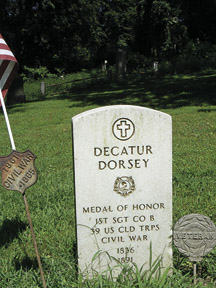When a town building was being cleaned out before its demolition, town employees stumbled across a Fire Department roll that read “Frank Girard, volunteer firefighter, killed in the Civil War, died 1864.”
Police Sgt. Victor Conversano Jr. was helping during the clean-up and said that stumbling across Girard’s name stuck with him.
Five years ago, Conversano joined the Phil Kearny Civil War Roundtable of Northern New Jersey. He is a part of a group of historians who research the war that changed the face of this country. They regularly convene to talk about what they find.
“It’s like doing an investigation,” said Conversano.
So when Conversano is faced with finding the identity of someone like Girard, he shares the information with his round table and then begins his research. He reached out to New Jersey Civil War historian Joseph Bilby, who was able to find out that a man by the same name served in the New York 15th Artillery Regiment, but there is no record of that man’s death.
Conversano said that is was normal for residents along the Hudson River so sign up for the Union forces in New York City.
Conversano found that this regiment has a historical unit, or a group of re-enactors, and he is now waiting to hear back from them in the hopes that they will know more.
If he can find more concrete evidence of Girard’s fate, Conversano hopes that his name could be placed on Guttenberg’s Veteran’s Monument located on J.F.K. Boulevard East.
Many soldiers buried in NB
According to the Hudson County Civil War Veterans database compiled by the Hudson County Genealogical Society, 28 North Bergen residents served during the war.
Conversano said that there are many soldiers buried in New Jersey and that there are quite a few in North Bergen’s Grove Church and Flower Hill Cemeteries.
“It’s like doing an investigation.” – Victor Conversano Jr.
________
“A couple have been washed off,” said Conversano.
One famous resident is Decatur Dorsey, who now rests in Flower Hill Cemetery. He was a former slave born in Maryland who enlisted in the Union Army in 1864 and joined the 39th United States Colored Infantry Regiment.
During the Siege of Petersburg, Union forces had hoped to break the cities defenses by using explosives in a tunnel dug behind Confederate forces. When it exploded a crater was formed in the center of the enemy lines.
Dorsey served as the color bearer and moved ahead of unit during the advance and planted the flag on the Confederate’s side of the battle field. When the Union was forced to pull back, he retrieved the flag and rallied the soldiers to for a second attack.
Two days after the battle he was promoted as a sergeant.
After the war, he went on to live in Hoboken, New Jersey.
He received the Medal of Honor for his actions, which was later lost after his death. According to published reports, his family has tried to get another medal issued, but the army no longer produces Civil War era medals and according to military policy, only immediate family members can receive them on behalf of the awardees.
“This guy has been buried here my all my life and I never knew this,” said Conversano. “I think it’s important. [Children] should learn this.”
Mayor in war?
There is also a possibility that a former mayor James Moore Jr., whose photo hangs in Town Hall, served during the Civil War. Beneath his photo is the date 1872, which is close to the time of the war. Conversano said that his hat has a Grand Army Republic pin on it and that his jacket seems to be a Civil War-era uniform.
He has had no definitive luck in finding Moore’s name. There was a James Moore Sr. who served in the 37th Regiment of New York. There is a possibility that the photo caption with the date is wrong, or that the other James Moore Jr. is a completely different person.
Not long ago
Conversano said that the Civil War was not that long ago historically, and that it was definitive in defining the United States regarding politics, culture, and slavery.
“There is a possibility that if the Civil War didn’t turn out as it did, maybe my relatives wouldn’t have come [to America],” said Conversano.
Tricia Tirella may be reached at TriciaT@hudsonreporter.com.
